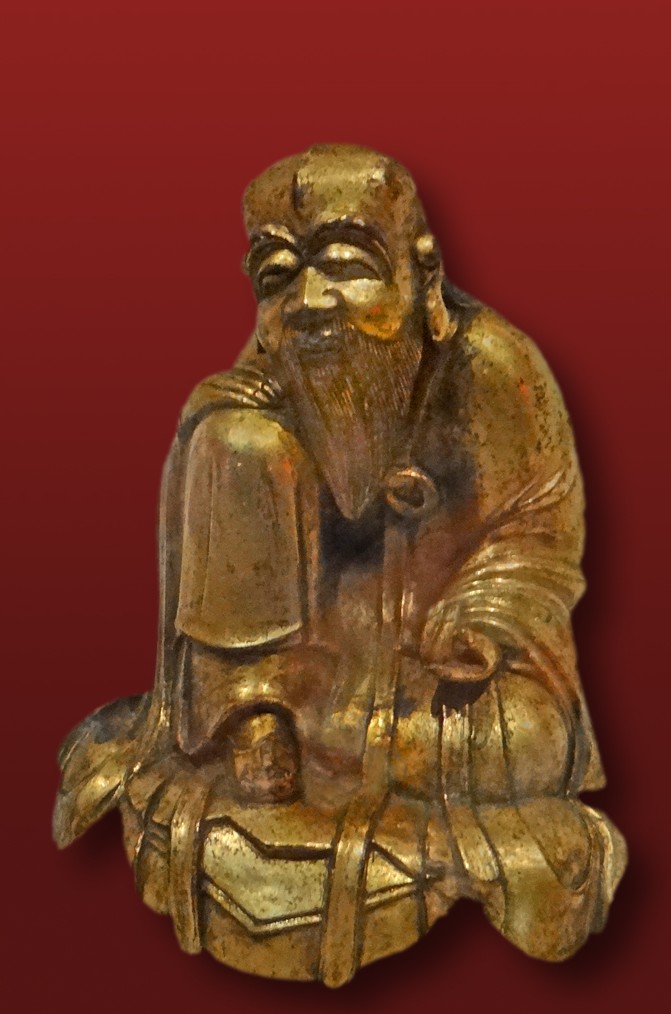
Chapter 17
With the highest kind of rulers, those below simply know they exist.
With those one step down – they love and praise them.
With those one further step down – they fear them.
And with those at the bottom – they ridicule and insult them.
When trust is insufficient, there will be no trust in return.
Hesitant, undecided! Like this is his respect for speaking.
He completes his tasks and finishes his affairs,
Yet the common people say, “These things all happened by nature.”
Chapter 18
Therefore, when the Great Way is rejected, it is then that we have the virtues of humanity and righteousness;
When knowledge and wisdom appear, it is then that there is great hypocrisy;
When the six relations are not in harmony, it is then that we have filial piety and compassion;
And when the country is in chaos and confusion, it it then that there are virtuous officials.
Chapter 19
Eliminate sageliness, throw away knowledge,
And the people will benefit a hundredfold.
Eliminate humanity, throw away righteounsness,
And the people will return to filial piety and compassion.
Eliminate craftiness, throw away profit,
Then we will have no robbers and thieves.
These three sayings –
Regarded as a text are not yet complete.
Thus, we must see to it that they have the following appended:
Manifest plainness and embrace the genuine;
Lessen self-interest and make few your desires;
Eliminate learning and have no undue concern.
(Translated by Robert Henricks)
Robert Henricks says that these three verses must be read together. They harken back to a golden age of peace and harmony that occurred during the reigns of the Three Sovereigns and Five Emperors, before the Xia dynasty, which itself preceded the Shang dynasty, the first to be documented with historical data. So this was the mythological time of the beginning, when rulers were gods or demi-gods, exercised power unobtrusively, and people spontaneously complied with their rule. The country was at peace, as such a hierarchical structure was understood to be part of nature as symbolised by Tao.
Together with his own translation of the Tao-te-ching, Red Pine provides a few commentaries by Chinese scholars on each chapter. I will be quoting a few of these here.
Ho-shang Kung says: “When the kingdom enjoys peace, no one thinks about kindness, and the people are free of desire. When the Great Way prevails, kindness and justice vanish, just as the stars fade when the sun rise.”
We would be forgiven for thinking that such an absolute power of the ruler over his people is not part of what Taoism is about, since its sages, especially Chuang-tzu appear to be free thinkers. Roger Ames & David Hall explain: “While certainly advocating a kind of political anarchism, the Daodejing still assumes the need for a hierarchical political structure, with rulers above and the common people below. What is distinctively anarchistic about the Daoist political order is the absence of coercion. The most efficacious regime is one in which those who rule carry out their administrative responsibilities so lightly and unobtrusively that the people are able to go about their business confidently without detecting any kind of manipulation … The expectation that social order emerges from the bottom up is a strong theme in this traditionally agrarian culture in which most adjustments are the informal business of the extended family.”
Then something reminiscent of the biblical Fall occurred. With a growth in the development of self-consciousness, “ the Great Way was rejected,” neither rulers nor the common people any longer believed that “things all happened by nature.” To maintain order and peace, the rulers started to talk about benevolence, righteousness, knowledge, wisdom, even filial piety and compassion. They said that values needed to be taught and enforced in order for an orderly society to be perdure.
Wang P’ang says: “During a virtuous age, obedience and love are considered normal, hence on one is called obedient or loving. Nowadays, when someone is obedient or loving, we praise them. This is because the six relations (father and son, elder and younger brother, husband and wife) are no longer harmonious. Also, when peace prevails, everyone is honest. How can there be honest officials?
This is clearly a criticism of Confucianism with its emphasis on benevolence and moral virtues. In spite of the fact that both Confucian and Taoist texts were found in the Ma-wang-hui and other tombs, which indicates that the occupant accepted both ways of thinking, Ames & Hall say that “it is difficult to read [chapter 18] … as anything other than an anti-Confucian polemic.
Te-ch’ing says: “Reason is what the sage uses to order the kingdom. It includes the arts, measurements, and laws. In the High Ages, people were innocent, and these were unknown. In the Middle-Ages, people began to indulge their feelings, and rulers responded with reason. And once reason appeared the people responded with deceit.”
The point here is that the explicit deliberate enforcement of values blocks their spontaneous arising. In the words of Ames and Hall, “When the authentic way of being human is thriving in the world, the family-based natural morality of the community takes care of itself, enabling its members to flourish and prosper. It is only in a period of decadence and decline that philosophers arise to proclaim the obvious, and in so doing, ironically exacerbate the problems by institutionalizing an artificial alternative that suffocates natural unmediated sentiment. What was spontaneous natural feeling becomes external rules of conduct, where the invocation of moral rules as an alternative to the spontaneous expression of feeling is dehumanizing.”
Examples that will be familiar to most readers is the way babies and toddlers are able to learn to speak, in fact, sometimes even in more than one language, before having set foot in a school, and as soon as they get there, may lose all interest in the process of learning, because they are now manipulated through a system of rewards and punishments! Again, while young children rush to help their mother to do everything she is doing, older children often refuse to help her with the easiest of housework.
Chiao Hung says: “The Ways of the world become daily more artificial. Hence we have names like wisdom and reason, kindness and justice, cleverness and profit. Those who understand the Tao see how artificial they are and how inappropriate they are to rule the world. There aren’t as good as getting people to focus their attention on the undyed and the uncarved. By wearing the undyed and holding the uncarved, our self-interest and desires wane. The undyed and the uncarved refer to our original nature.”
For Taoism, rather than artificially enforcing values, the way forward is to allow the spontaneous arising of naturalness through wuwei, spontaneous, non-coercive action. Ames & Hall write: “Just as the boundless field of experience in which the human life is lived unfolds according to its own internal equilibrium without being secured by anything beyond it, so the human social and political order should proceed according to its own internal rhythms without relying upon some top-down source to discipline it. The ruler’s occupation is wuwei: to bring together the concerted efforts of the people and to be the coordinate around which these contributions are synchronized to maximum benefit.”
Sources:
Robert G Henricks – Lao-Tzu, Te-Tao Ching
Roger T Ames and David L Hall – A philosophical Translation – Dao De Jing – Making this Life Significant”
Red Pine (Bill Porter) – Lao-tzu’s Taoteching
